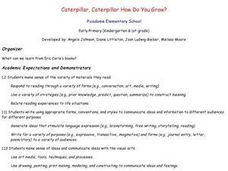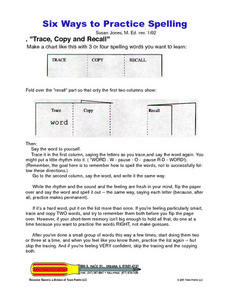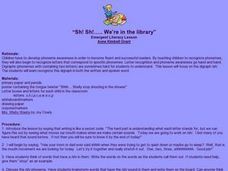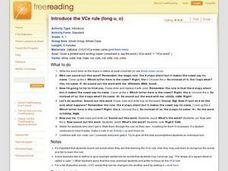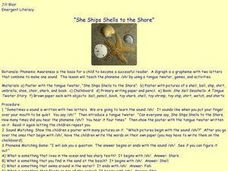Curated OER
Caterpillar, Caterpillar How Do You Grow?
Students work in small groups of three or four to create books based on the Eric Carle books studied. Topics may include tadpoles, guppies, people, moths, and plants. Media used may include Kid Pix, sound recordings, art pieces,...
Curated OER
Shh, Do Not Wake the Baby!
Students explore the /sh/ digraph and how it is a blending of the /s/ and /h/ sounds. They use letterbox manipulatives to spell 'sh' words and identify /sh/ words as they read a story. They 'fish' for 'sh' words to practice writing at...
Curated OER
Bedtime Fun
Students use picture clues to sound out the beginning of words. They apply this story to them actually going to bed. At the end, students should be able to follow a story line to a conclusion. To engage students, the teacher asks...
Curated OER
Rhyming Words – Exercise 54
In this online interactive phonemes practice worksheet, students examine 4 words that are missing letters. Students fill in the blanks with the appropriate consonants to consonant blends to complete them. Students may check their answers.
Curated OER
ABC Song
In this ABC song worksheet, students watch the video and fill in the blanks for the song that contains each letter of the alphabet. Students complete 26 blanks in the song and complete sentences about the song.
Curated OER
Six Ways To Recall Spelling Words
Students practice their weekly spelling words. Using six methods of recall, students practice spelling their words orally and using pen and paper. They demonstrate their recall of the spelling words by completing a spelling test at the...
Curated OER
Reading and Comprehension: UFOS
For this interactive reading comprehension worksheet, learners read two short entries about UFOS. They match the text with the pictures that go with the story and write the letter in the box at the end of each. They enter their...
Curated OER
Suffix "th"
In this suffix "th" worksheet, students practice their phonics skills as they examine 6 number words. Students record the letters in each of the blanks making note of the "th" sound.
Curated OER
Conversation Exercises: "So Do I" or "Neither Do I"
In this online conversation exercise activity, students read how to use "So do I!" and "Neither do I!" They complete complete 8 sentences by listening to the sentences and responding. They choose the correct response in each of 12...
Curated OER
Fun Fonix: Say it. Trace and Write in the A. Read it.
For this phonics worksheet, 1st graders respond to 9 questions by saying the word represented in the picture, tracing and writing an "a" in the space provided (middle of each word), and reading the newly formed word.
Curated OER
Sh! Sh! We're in the Library
Students focus on the diagraph of sh. They recognize this in both the written and spoken word. To introduce this lesson, the teacher asks if anyone's mom or dad has told them shhhh, when they were trying to get them to quiet down. ...
Curated OER
Phonics: Short E
In this short E worksheet, students say what each of the nine pictures are, trace and write in the e in each of the nine words and then read out loud each one.
Curated OER
CVC Pattern with "o" as a Short Vowel- Picture/Word Identification
In this CVC short "o" spelling pattern worksheet, 1st graders say the name of each black line picture. They write the names using the 10 words that are listed in the word bank at the bottom of the page.
Curated OER
Introduce the VCe rule (Long u, o)
Learners say the word "dime" as the teacher writes it on the board and reviews the silent e/long vowel rule. In this phonics lesson, students say other words and review the rule as words are written on the board, first without the ending...
Curated OER
Introduce the VCe rule (Long i)
Pupils sound out the word "made" as the teacher reviews the rule for silent e making vowels say their names. In this phonics lesson, students continue to sound out words with other long vowels and the silent e, with teacher guidance.
Curated OER
Icky Sticky and Itty Bitty
Students identify the letter i and the sound that it makes in various words and illustrations with the sound /i/. They practice writing the letter I both upper and lower case on paper. Finally, students circle the pictures with the...
Curated OER
O No!
First graders distinguish between short vowel a and long vowel O. They are introduced to the vowel-consonant-e pattern that changes short vowel sounds into long vowel sounds. They practice spelling words with the vowel-consonant-e pattern.
Curated OER
Decoding
Students decode words containing r-controlled vowels. In this r-controlled vowel lesson plan, students use letter tiles to make words containing specific vowel patterns, and substitute letters to make new words, while the teacher writes...
Curated OER
Ending Consonants #13
In this ending consonant worksheet, students say the sound of a letter at the beginning of a row, name pictures and circle the picture that ends with that consonant sound. A reference web site is given for additional activities.
Curated OER
Telegraphy
Students research the telegraph. In this telegraph lesson plan, students review the history of the telegraph. Students complete radio wave experiments. Students work in pairs to complete 3 sound exercises.
Curated OER
She Ships Shells to the Shore
First graders identify the digraph /sh/ in written and spoken language. After a brief discussion the independent and combined sounds of the phonemes /s/ and /h/ students practice identifying initial and final placement of the new digraph...
Curated OER
"Whaaa" Said The Baby"
Young scholars recognize phonemes that correspond with the letters in the alphabet. They focus on identifying the short a, /a/ sound. They examine the way their mouths move when making the short a sound mimicking a baby's cry. In given...
Curated OER
Double S, F, and Z
In this spelling activity worksheet, students add another consonant to complete the 12 words. Students rewrite the words in the next 12 examples. Students then read the sentences and look for the double s, f, and z letters. Students...
Curated OER
The See-Saw: How to Blend
First graders listen as the word "cat" is sounded out spreading out all the sounds contained. They discover the meaning of blending using the word "cat" and then changing the consonants to make new words. They then figure out new words...


